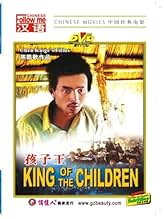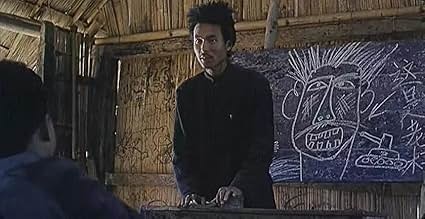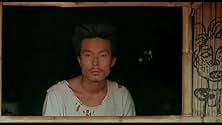Ajouter une intrigue dans votre langueThis film is adapted from the novel of Ah Cheng. During the Cultural Revolution (1966-1976), a young man is assigned to teach in village school.This film is adapted from the novel of Ah Cheng. During the Cultural Revolution (1966-1976), a young man is assigned to teach in village school.This film is adapted from the novel of Ah Cheng. During the Cultural Revolution (1966-1976), a young man is assigned to teach in village school.
- Réalisation
- Scénario
- Casting principal
- Récompenses
- 4 victoires et 3 nominations au total
Avis à la une
Haizi Wang focuses on a group of "sent down youth": teenagers exiled to the countryside in the far SW province of Yunnan during the cultural revolution. The protagonist accepts a job as a teacher in an impoverished school and begins teaching his rural pupils in the traditional manner--the instructor transcribes the text of the lesson on the chalkboard, the students recite the lesson aloud, and copy the text in their notebooks. His most ambitious student takes on the task of transcribing the entire dictionary.
The subject of this film is the propagation of Chinese cultural values through traditional style of education. This theme reflects a view prevalent among Chen Kaige's generation who experienced the CR first hand: even though the Cultural Revolution set out to do away with the trappings of China's "feudal" cultural heritage, the language and rhetoric of the participants was infused with deep rooted, "traditional feudal values." Thus the CR only succeeded in replicating the same values it sought to eradicate.
The cinematography and narrative structure of the Haizi Wang underscore the director's concern with breaking from blind imitation of conventional filmmaking.
**Contrast with other films about sent down youth: Sacrificed Youth and Xie Jin's The Herdsman.
The subject of this film is the propagation of Chinese cultural values through traditional style of education. This theme reflects a view prevalent among Chen Kaige's generation who experienced the CR first hand: even though the Cultural Revolution set out to do away with the trappings of China's "feudal" cultural heritage, the language and rhetoric of the participants was infused with deep rooted, "traditional feudal values." Thus the CR only succeeded in replicating the same values it sought to eradicate.
The cinematography and narrative structure of the Haizi Wang underscore the director's concern with breaking from blind imitation of conventional filmmaking.
**Contrast with other films about sent down youth: Sacrificed Youth and Xie Jin's The Herdsman.
10zzmale
In contrast to his previous works of carefully concealing the criticism of not-so-favorite part of Chinese tradition, this film took a completely different turn: although generally shaped by the social criticism, namely, targeting Cultural Revolution, there is a praise of the good part of traditional Chinese culture, such as the dedication for the next generation, the endurance, the emphasis on education.
King of the Children (Haizi Wang) may have a General Audiences rating; however it is far from a general audiences film (especially Western audiences). The film is too austere, too realistic, and too poignant to be appreciated by the vast majority of Western viewers. They appreciate teaching films like Goodbye, Mr Chips (both the classic original with Robert Donat and the passable remake with Peter O'Toole), Conrack, To Sir With Love, Stand and Deliver, Dead Poet's Society, and even Mr. Holland's Opus. These are all fine films in their own right, and I may have left off one or two of the viewers' favorites, but this films annihilates them for sheer raw power.
Set in a very poor countryside village in the early 1970s, the settings of the other teacher films on the list are luxurious in comparison. The ghetto of Los Angeles is a luxury resort compared to these villages and the struggle of these Chinese peasants to merely survive every day with food and clothing. We do not see communism at all in any of these scenes; merely poverty and people pulling together to survive in a basic socialistic approach. There is no other way to survive these conditions. Chen Kaige is one of the two greatest directors in Chinese cinema (the other being Zhang Yimou). And it shows in this stunningly beautiful, and at the same time, ugly, film. The movie requires a great deal of patience to watch (I viewed it with no subtitles and had no problem understanding every scene; the mark of a great filmmaker). Few Americans will have the patience to endure the film, nor the intelligence to appreciate it, but some will. It is a trip worth taking.
Set in a very poor countryside village in the early 1970s, the settings of the other teacher films on the list are luxurious in comparison. The ghetto of Los Angeles is a luxury resort compared to these villages and the struggle of these Chinese peasants to merely survive every day with food and clothing. We do not see communism at all in any of these scenes; merely poverty and people pulling together to survive in a basic socialistic approach. There is no other way to survive these conditions. Chen Kaige is one of the two greatest directors in Chinese cinema (the other being Zhang Yimou). And it shows in this stunningly beautiful, and at the same time, ugly, film. The movie requires a great deal of patience to watch (I viewed it with no subtitles and had no problem understanding every scene; the mark of a great filmmaker). Few Americans will have the patience to endure the film, nor the intelligence to appreciate it, but some will. It is a trip worth taking.
Sometimes it happens, but it happened to Cheng Kaige very sadly. I say about the cases when very talented young director, who could have become one of 10 greatest directors in history of cinema, loses his potential greatness by the underestimation of his best film. It happened to Sokurov's "The days of eclipse", but not so sadly. It didn't happen to Robert Bresson, because he had very strong will and faith.
Why,this vivid and human film with ambitious vision,did won nothing in Canne, without the most shameful prize for the most boring film!! Juries were fools? Or they refused to give Chinese director any honor to his artistic results(I say it not because I'm an Asian,but because I love film art)? I can't understand it at all.
"Hai zi wang" is cheerful as Jan Vigo' films, human as Kurosawa's best films, revolutional as Antonioni's best films, beautiful as Tarkovsky's best films. Yes, it has some weakness compared with them, but we can understand the reason. 1987 is the time, when all great directors of older generation had already done their best works or already died. And in China all progressive cinema hadn't shown. Studio system was dead almost everywhere in the world.
The result of this underestimation pushed the director toward Hollywood. The next film was still good, but not as "Hai zi wang". The film about two actors of traditional Chinese theater won in Canne, but is was completely different film, with Hollywood style.
The great director Cheng Kaige has lost his way...
We, spectator can still compensate for this. Just watch this human story, with philosophical depth and cinematographic novelty, and remember it as film art. And let's welcome and estimate properly when such films will appear next time.
Why,this vivid and human film with ambitious vision,did won nothing in Canne, without the most shameful prize for the most boring film!! Juries were fools? Or they refused to give Chinese director any honor to his artistic results(I say it not because I'm an Asian,but because I love film art)? I can't understand it at all.
"Hai zi wang" is cheerful as Jan Vigo' films, human as Kurosawa's best films, revolutional as Antonioni's best films, beautiful as Tarkovsky's best films. Yes, it has some weakness compared with them, but we can understand the reason. 1987 is the time, when all great directors of older generation had already done their best works or already died. And in China all progressive cinema hadn't shown. Studio system was dead almost everywhere in the world.
The result of this underestimation pushed the director toward Hollywood. The next film was still good, but not as "Hai zi wang". The film about two actors of traditional Chinese theater won in Canne, but is was completely different film, with Hollywood style.
The great director Cheng Kaige has lost his way...
We, spectator can still compensate for this. Just watch this human story, with philosophical depth and cinematographic novelty, and remember it as film art. And let's welcome and estimate properly when such films will appear next time.
This was kind of a trippy experience for me and not at all what I would've expected after let's say Yellow Earth. It's very elusive with it's ideas, possibly due to the censorship, It's suggestive enough so that I have a few suspicions about some of what is happening, it has some dream-like scenes, which the director did not employ in any of his other movies that I have seen, it's got some beautiful visuals that are quite artistic in these very minimalistic sets and bare landscapes. That dried out tree is the subject of several surreal compositions. It's a climate I cannot make sense of, the area looks both lush and barren, droughty. The school is in the open air, apart from the thatched roof practically.
I don't really understand the ending, it was again a little trippy, I don't know whether the mountain on fire was just a reflection of that poem of a manifestation of the last line of dialogue and why. Maybe censorship caused the writers to get creative and lend the story to several interpretations. I resented that a little. The dialogues are also very inconclusive, especially when it matters. I had bad subtitles clearly, but all the same. The higher ups disliked his teaching methods. It's not clearly stated whether he was in a labour/reeducation camp, but it looked like it. He had been in the area for seven years but I don't think he taught the children more than a few months. It's said he was unschooled but he was clearly well read. It's a little annoying not knowing for sure. In Chinese it seems it's important to achieve knowledge of as many words as possible. The higher the number, the better. In that regard he was obviously qualified to teach. And then there's this guy's hair, which was trippy in itself. Was this a reflection of eighties' sensibilities or some people's hair just sits like that? See, I can't shake these thoughts...
I don't really understand the ending, it was again a little trippy, I don't know whether the mountain on fire was just a reflection of that poem of a manifestation of the last line of dialogue and why. Maybe censorship caused the writers to get creative and lend the story to several interpretations. I resented that a little. The dialogues are also very inconclusive, especially when it matters. I had bad subtitles clearly, but all the same. The higher ups disliked his teaching methods. It's not clearly stated whether he was in a labour/reeducation camp, but it looked like it. He had been in the area for seven years but I don't think he taught the children more than a few months. It's said he was unschooled but he was clearly well read. It's a little annoying not knowing for sure. In Chinese it seems it's important to achieve knowledge of as many words as possible. The higher the number, the better. In that regard he was obviously qualified to teach. And then there's this guy's hair, which was trippy in itself. Was this a reflection of eighties' sensibilities or some people's hair just sits like that? See, I can't shake these thoughts...
Meilleurs choix
Connectez-vous pour évaluer et suivre la liste de favoris afin de recevoir des recommandations personnalisées
Détails
- Durée1 heure 46 minutes
- Mixage
- Rapport de forme
- 1.85 : 1
Contribuer à cette page
Suggérer une modification ou ajouter du contenu manquant

Lacune principale
By what name was Le roi des enfants (1988) officially released in Canada in English?
Répondre


















